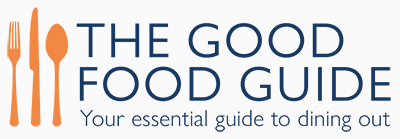About The Good Food Guide
Best of British
For the past 75 years The Good Food Guide has built a reliable, trusted picture of Britain’s best places to eat. Every seafood shack, pub, hole-in-the-wall and £375 tasting menu restaurant that makes it into the Guide has been rigorously tested by one of our anonymous inspectors, experts in their local areas across the country. Unlike other guides we don’t just focus on the fancy stuff, we’re here to show you the full spectrum.
Reviews you can trust
We pay for our own meals, because it’s easy to enjoy a meal when you’re not paying for it. Our anonymous inspectors dine like any normal customer and pay the bill at the end. There’s no special treatment and no freebies to sweeten the deal. It means we’re able to provide an accurate picture of what to expect and carefully weigh up whether it’s worth your hard-earned cash.
Depth & detail
We use a scoring system to rate restaurants, with sub scores in different areas leading to our main score. Scoring delivers a snapshot of what to expect at a glance, but our detailed reviews give you the full picture. Get a flavour of the menu, the atmosphere and whether you can expect a relaxed meal or indifferent service. We also gather extensive information directly from restaurants, so using the filter you can work out where you can bring your dog, if you can charge your car and whether there’s background music.
For serious food lovers
Membership to The Good Food Guide gives members access to over 1200 trusted restaurant reviews, extensive lists of where to eat in and around Britain and exclusive content and knowledge from expert writers, chefs and restaurateurs. As well as this, members get access to exclusive dining perks, from money off the bill at Good Food Guide restaurants, to complimentary courses and welcome drinks. Members can also join us at our events, from restaurant previews to foraging walks, and unique dining experiences with renowned chefs. Become a member today.
The inspectors
While it’s an enviable task, the role of an inspector requires a wealth of knowledge and professional experience. The current team includes ex-restaurateurs and chefs as well as experienced editors, food writers and critics.
At the moment, we aren't actively recruiting for new inspectors. However, we always welcome your feedback on establishments you have recently visited. It is not unusual for prolific reviewers to be quoted in entries to the Guide.
The team
Thousands of readers
75 years' worth of reader feedback has powered The Good Food Guide, with knowledgeable restaurant goers reporting back on promising emerging talent around the country. It lends comprehensive geographical coverage, rather than focusing on metropolitan food hotspots. Submit your own feedback to our editors on our feedback form.
30 anonymous inspectors
A venerable collection of writers, editors and academics form our line-up of 30 inspectors, stationed around Scotland, Wales and England. You won’t find out who they are as their anonymity is highly prized and allows the Guide to carry out inspections under the guise of any normal customer.
2 editors
Elizabeth Carter has been at the helm of The Good Food Guide since 2008 and has an unparalleled perspective and knowledge of Britain’s dining scene. A frequent traveller to New York, she brings an international outlook to emerging trends and the standards we should expect on the modern dining scene. Co-editor is Chloë Hamilton who is as happy driving six hours to a Best Local Restaurant contender in Wales as she is getting her hands dirty exploring the best of British growers and producers.
The team
Since 2021 The Good Food Guide has been owned by Knife & Fork Media, who also run the industry perks platform CODE Hospitality.
History of the guide
The Good Food Guide was first compiled by Raymond Postgate in 1951. Appalled by the British post-war dining experience, Postgate recruited an army of volunteers to inspect restaurants anonymously and report back. His aims were simple; among them, ‘to raise the standard of cooking in Britain’ and ‘to do ourselves all a bit of good by making our holidays, travels and evenings-out in due course more enjoyable’.
Although much has changed since the very first edition of The Good Food Guide, the ethos of the original book remains. The Guide is about empowering diners, helping readers to find the very best places to eat and encouraging restaurants to offer the best possible food, service and experience.
One change for the better over the years is the industry’s efforts to move on from bullying kitchen cultures that reigned in many fine-dining establishments. We take a strong view on kitchen abuse and in order to encourage positive working environments we will temporarily remove any restaurant that is shown to neglect the welfare and mental health of its staff until we are satisfied that the necessary steps have been taken to change.
Sign up to our free newsletter
Stay up to date with the latest restaurant news, travel guides and dining inspiration across Britain in the free Good Food Guide Weekly newsletter

